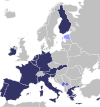استراتيجية لشبونة
| الاتحاد الاوروپي |
 هذه المقالة جزء من سلسلة مقالات عن: |
استراتيجية لشبونة Lisbon Strategy، وتُعرف أيضاً بإسم أجندة لشبونة Lisbon Agenda أو عملية لشبونة، كانت خطة أعمال وخطة تنمية صيغت في 2000، لاقتصاد الاتحاد الأوروپي بين 2000 و 2010. وقد لعبت الاقتصادية البرتغالية ماريا جواو رودريگز دوراً محورياً في صياغة الاستراتيجية.
Its aim was to make the EU "the most competitive and dynamic knowledge-based economy in the world capable of sustainable economic growth with more and better jobs and greater social cohesion", by 2010.[1] It was set out by the المجلس الأوروپي في لشبونة في مارس 2000. By 2010, most of its goals were not achieved. وقد تلتها استراتيجية أوروپا 2020.
الخلفية والأهداف
The Lisbon Strategy intended to deal with the low productivity and stagnation of economic growth in the EU, through the formulation of various policy initiatives to be taken by all EU member states. The broader objectives set out by the Lisbon strategy were to be attained by 2010.
It was adopted for a ten-year period in 2000 in Lisbon, Portugal by the European Council. It broadly aimed to "make Europe, by 2010, the most competitive and the most dynamic knowledge-based economy in the world".
الاستراتيجية
The main fields were economic, social, and environmental renewal and sustainability. The Lisbon Strategy was heavily based on the economic concepts of:
- Innovation as the motor for economic change (بناء على كتابات جوسف شومپيتر)
- "اقتصاد التعلم"
- التجديد الاجتماعي والبيئي
كبار المفكرين والمفاهيم
Contemporary key thinkers on whose works the Lisbon Strategy was based and/or who were involved in its creation include Maria João Rodrigues, Christopher Freeman, Bengt-Åke Lundvall, Luc Soete, Daniele Archibugi Carlota Perez, Manuel Castells, Giovanni Dosi, and Richard Nelson.[2]
Key concepts of the Lisbon Strategy include those of the knowledge economy, innovation, techno-economic paradigms, technology governance, and the "open method of coordination" (OMC).
انظر أيضاً
- Europe 2020, the updated strategy for the next decade
- Economy of the European Union
- Aho report
- Community patent
- European Institute of Technology (EIT)
- Innovative Medicines Initiative
- Knowledge triangle
- Sapir Report
- Science and technology in Europe
جماعات الضغط
- Euroscience
- Transatlantic Business Dialogue, which took part in the report for a new restart of the agenda
- Union of Industrial and Employers' Confederations of Europe (UNICE)
- European Trade Union Confederation (ETUC)
المراجع
- ^ European Union Parliament Website Lisbon European Council 23 and 24 March Presidency Conclusion
- ^ The intellectual background of the Lisbon strategy has been discussed in D. Archibugi and B-A. Lundvall (eds.), The Globalising Learning Economy, Oxford University Press, 2000 and in E. Lorenz and B-A. Lundvall, How Europe's Economies Learn, Oxford University Press, 2006.
للاستزادة
- Daniele Archibugi and B-A. Lundvall (eds.) (2000), The Globalising Learning Economy, Oxford University Press.
- Maria João Rodrigues (2003), European Policies for a Knowledge Economy, Edward Elgar.
- Edward Lorenz and B-A. Lundvall (eds.) (2006),How Europe's Economies Learn, Oxford University Press, 2006.
- Maria João Rodrigues (2009), Europe, Globalization and the Lisbon Agenda in collaboration with I. Begg, J. Berghman, R. Boyer, B. Coriat, W. Drechsler, J. Goetschy, B.Å. Lundvall, P.C. Padoan, L. Soete, M. Telò and A. Török, Edward Elgar.
- Arno Tausch (2010), Titanic 2010?: The European Union and Its Failed Lisbon Strategy (European Political, Economic and Security Issues Series) Hauppauge, New York: Nova Science Publishers
- Aristovnik, Aleksander & Andrej, Pungartnik, 2009. "Analysis of reaching the Lisbon Strategy targets at the national level: the EU-27 and Slovenia", MPRA Paper 18090, University Library of Munich, Germany.
- Copeland, Paul & Papadimitriou, Dimitris (eds.) (2012) The EU's Lisbon Strategy: evaluating success, understanding failure. Basingstoke: Palgrave Macmillan.
وصلات خارجية
- Sapir, André (2003): An Agenda for a Growing Europe, Making the EU Economic System Deliver. Report of an Independent High-Level Study Group established on the initiative of the President of the European Commission
- Euractiv background article about the Lisbon Agenda
- Stefan Collignon, Forward with Europe: a democratic and progressive reform agenda after the Lisbon strategy, Friedrich-Ebert-Stiftung, Internat. Politikanalyse, April 2008.
- The Economist – Charlemagne Blog: Do Europeans want a dynamic economy?
- Joachim Fritz-Vannahme, Armando García Schmidt, Dominik Hierlemann, Robert Vehrkamp: "Lisbon – A Second Shot", spotlight europe 2010/02, February 2010, Bertelsmann Stiftung (PDF, 340 kB)
- Friedrich-Ebert-Stiftung, Study Group Europe: Paving the way for a sustainable European prosperity strategy, February 2010 (PDF, 135 kB)
- Network of towns inspired by Lisbon Strategy
- European Trade Union Confederation update on the Lisbon strategy


